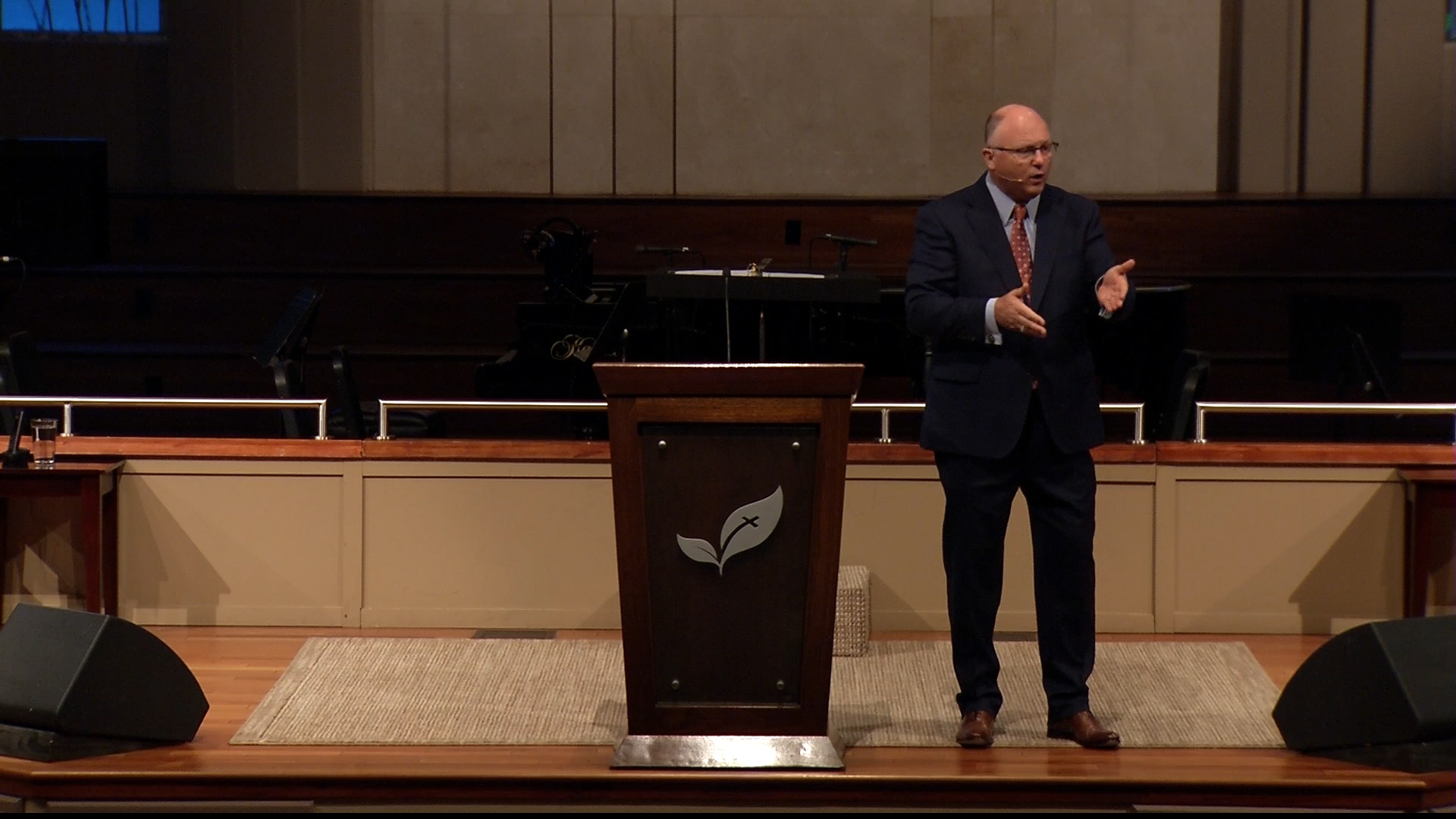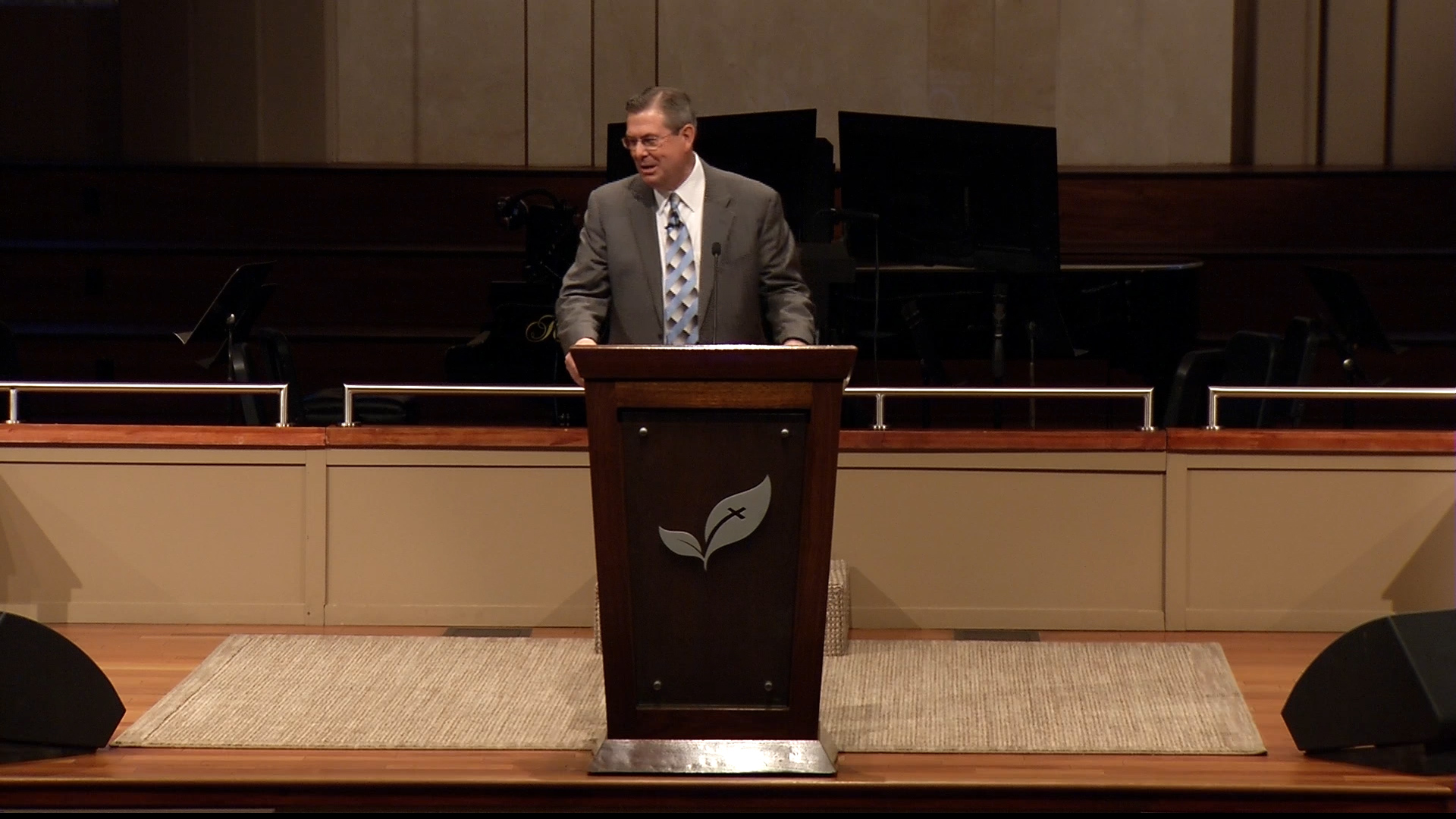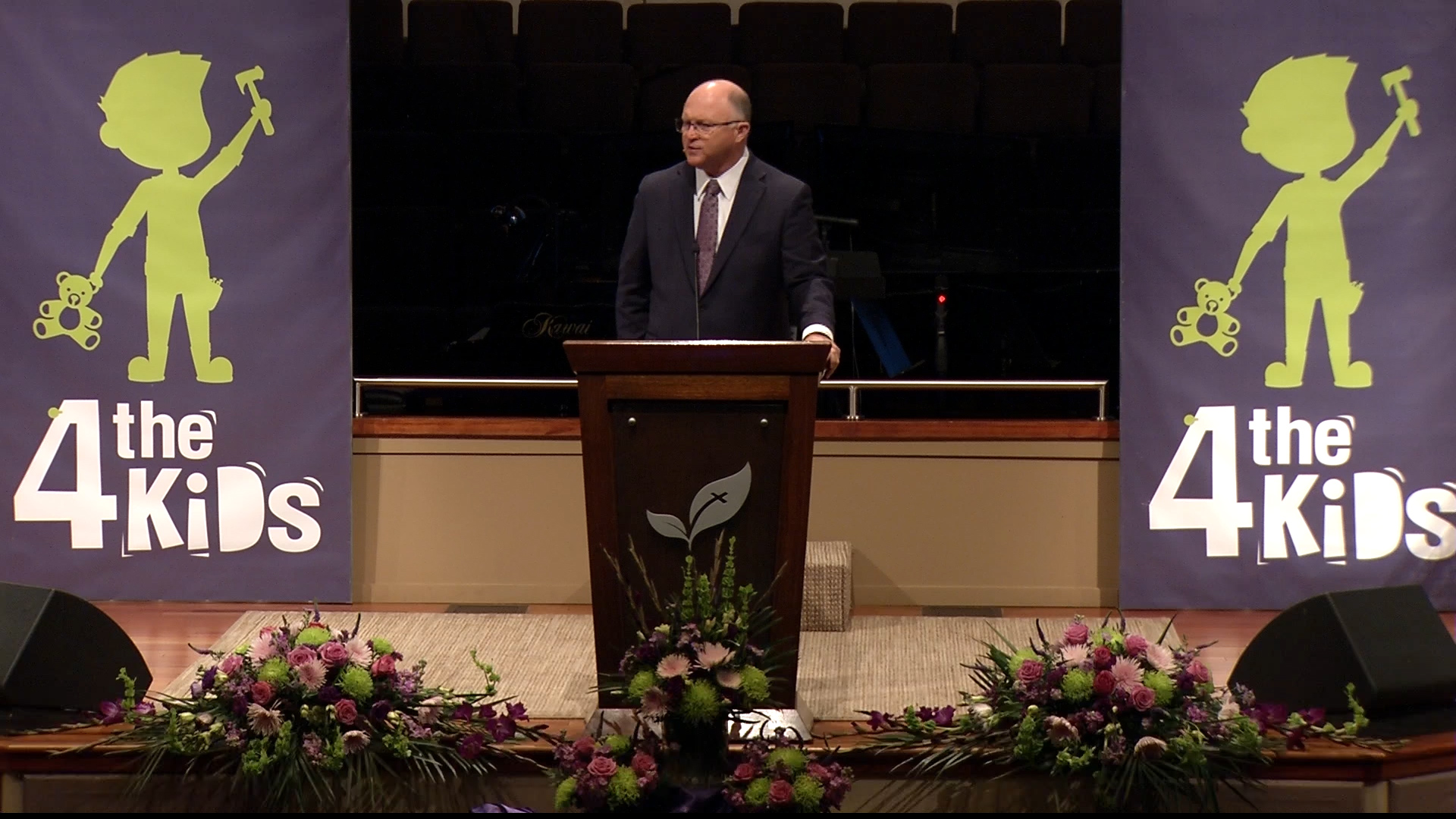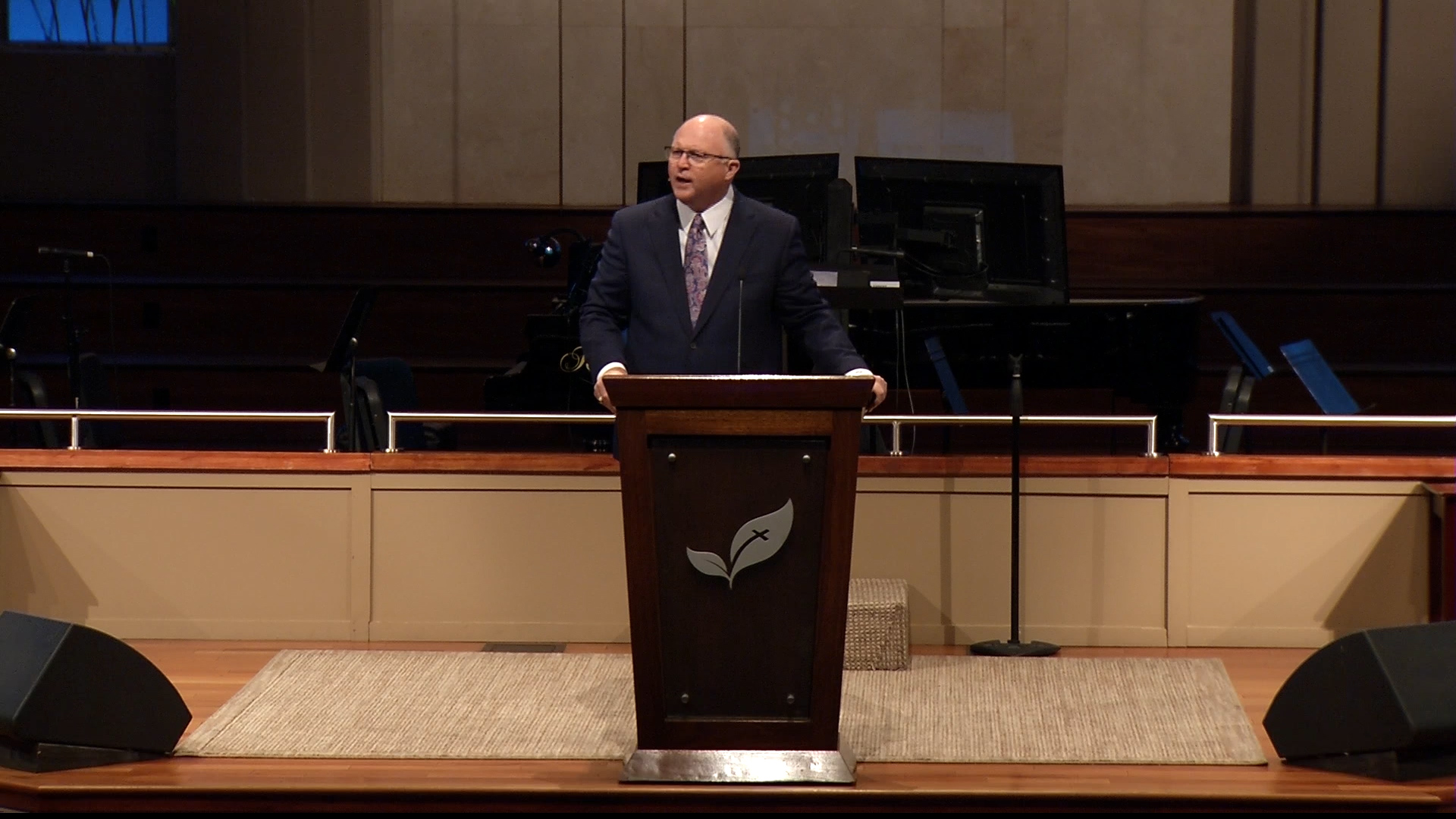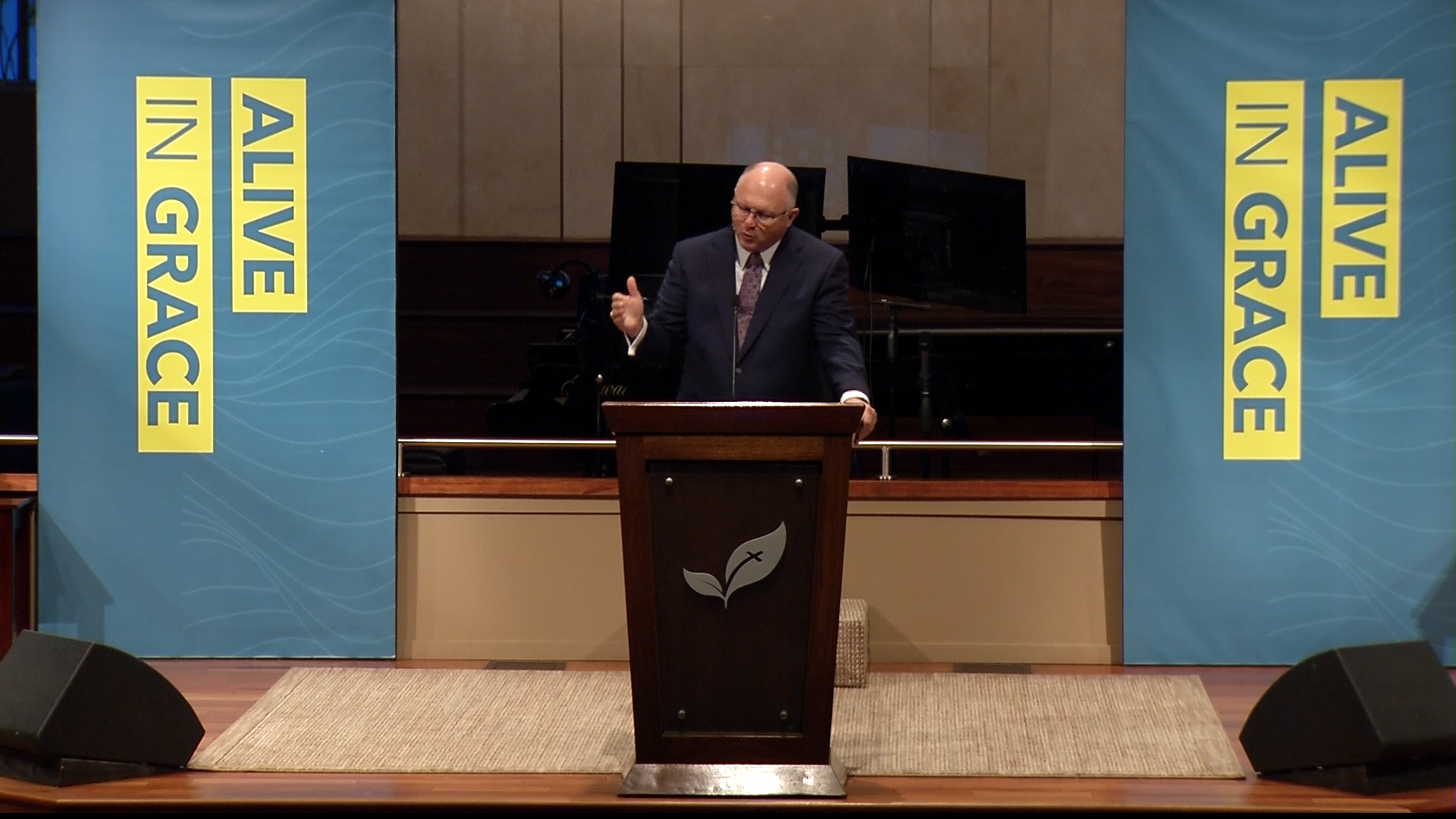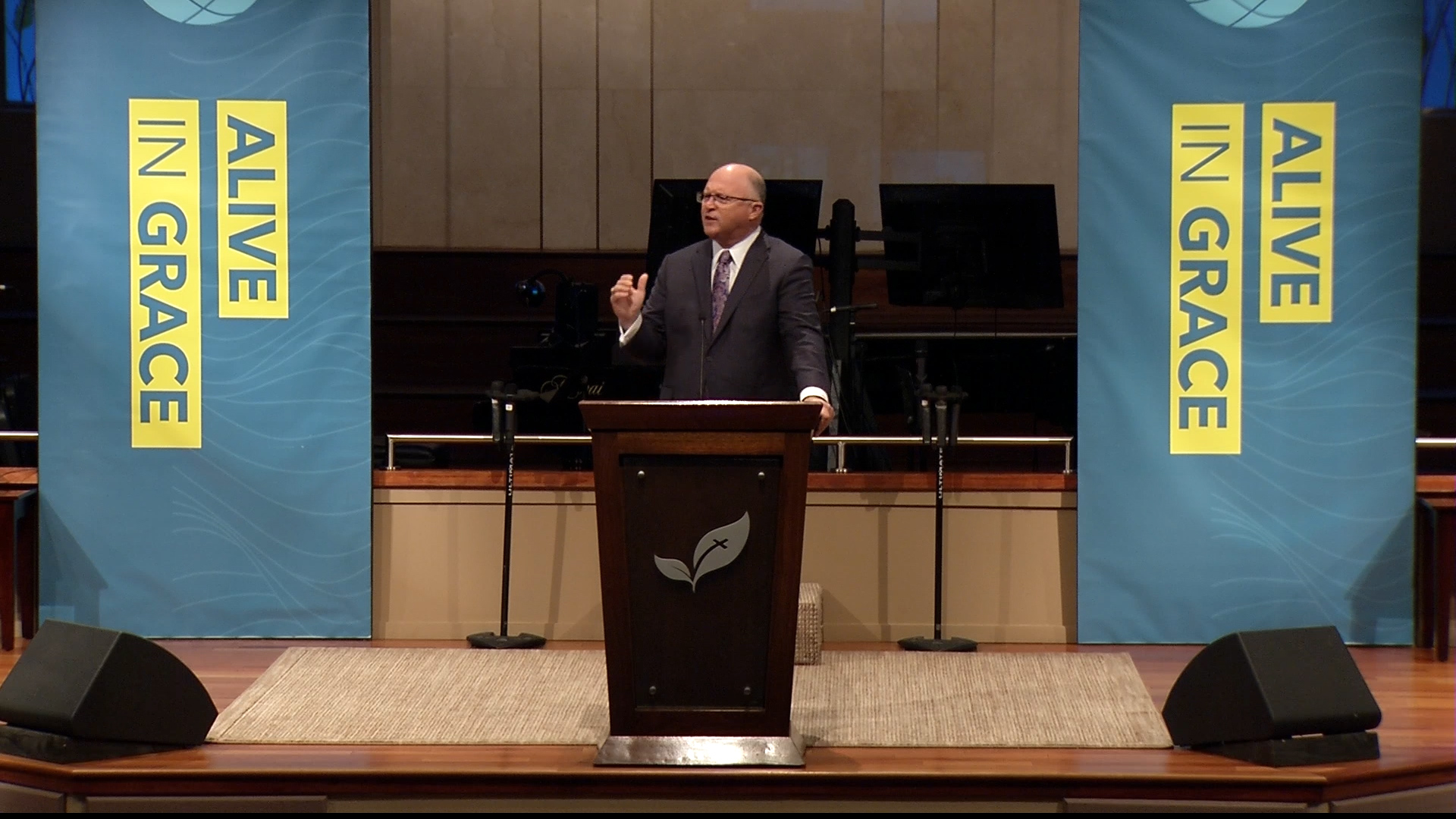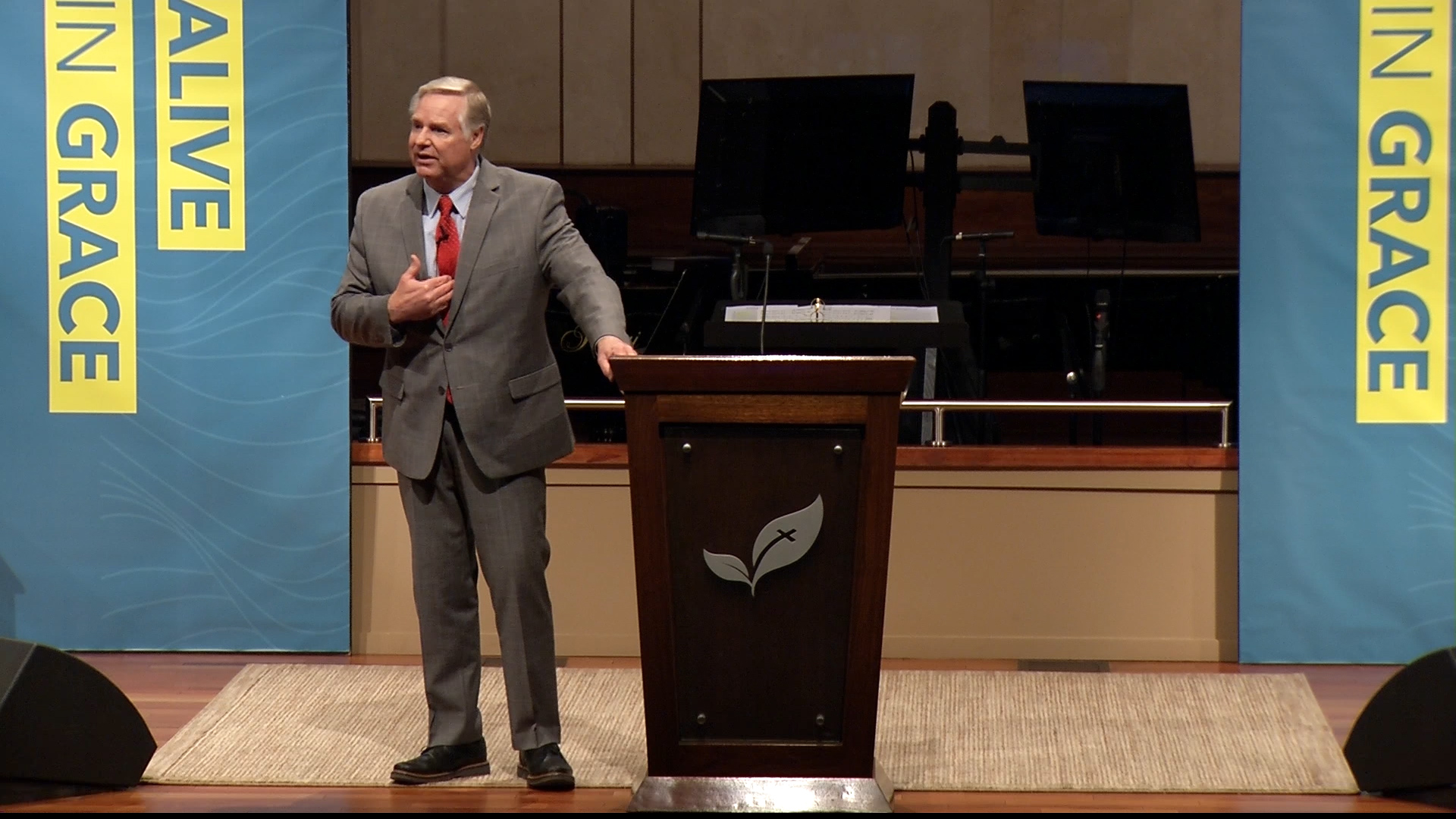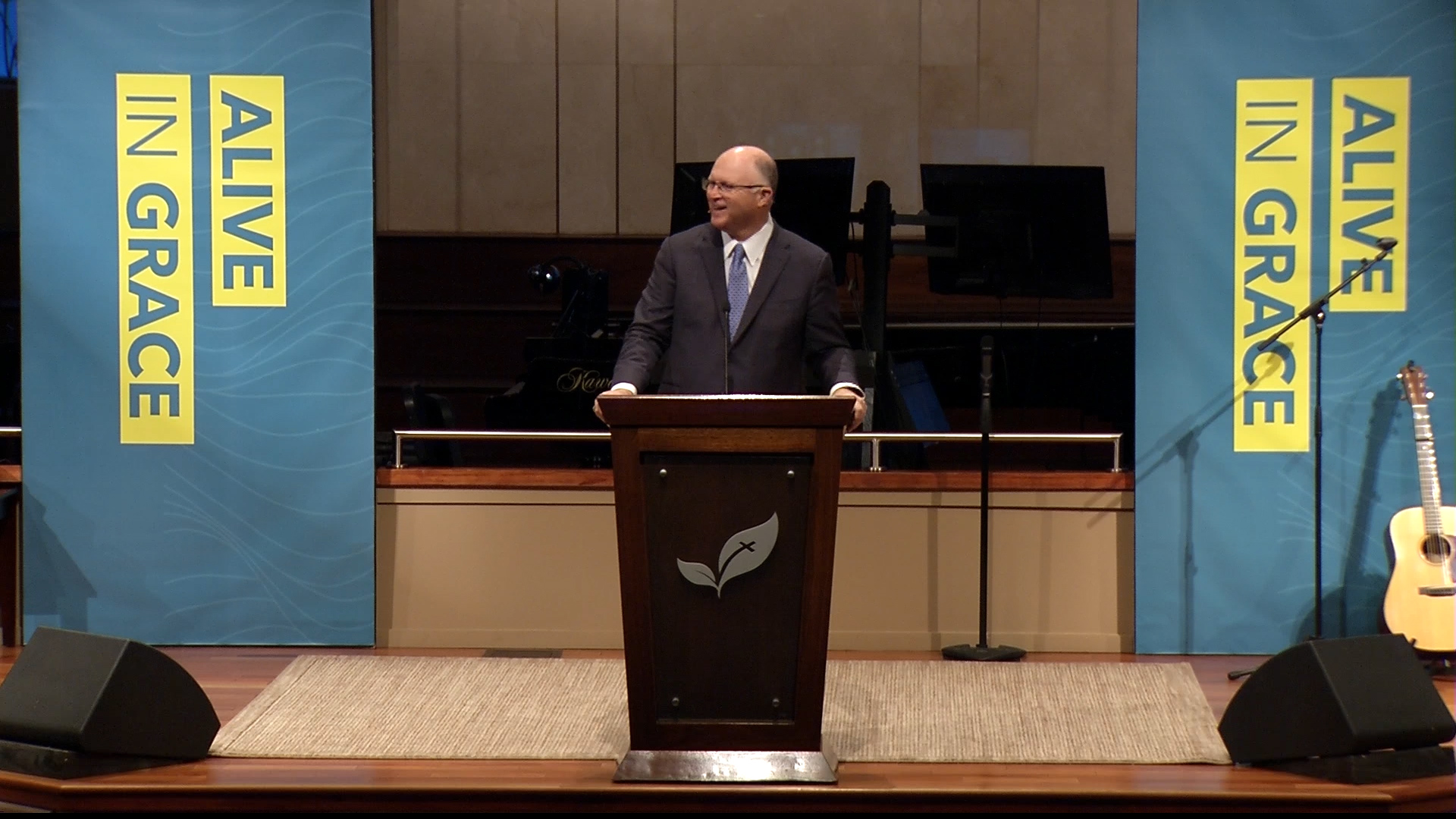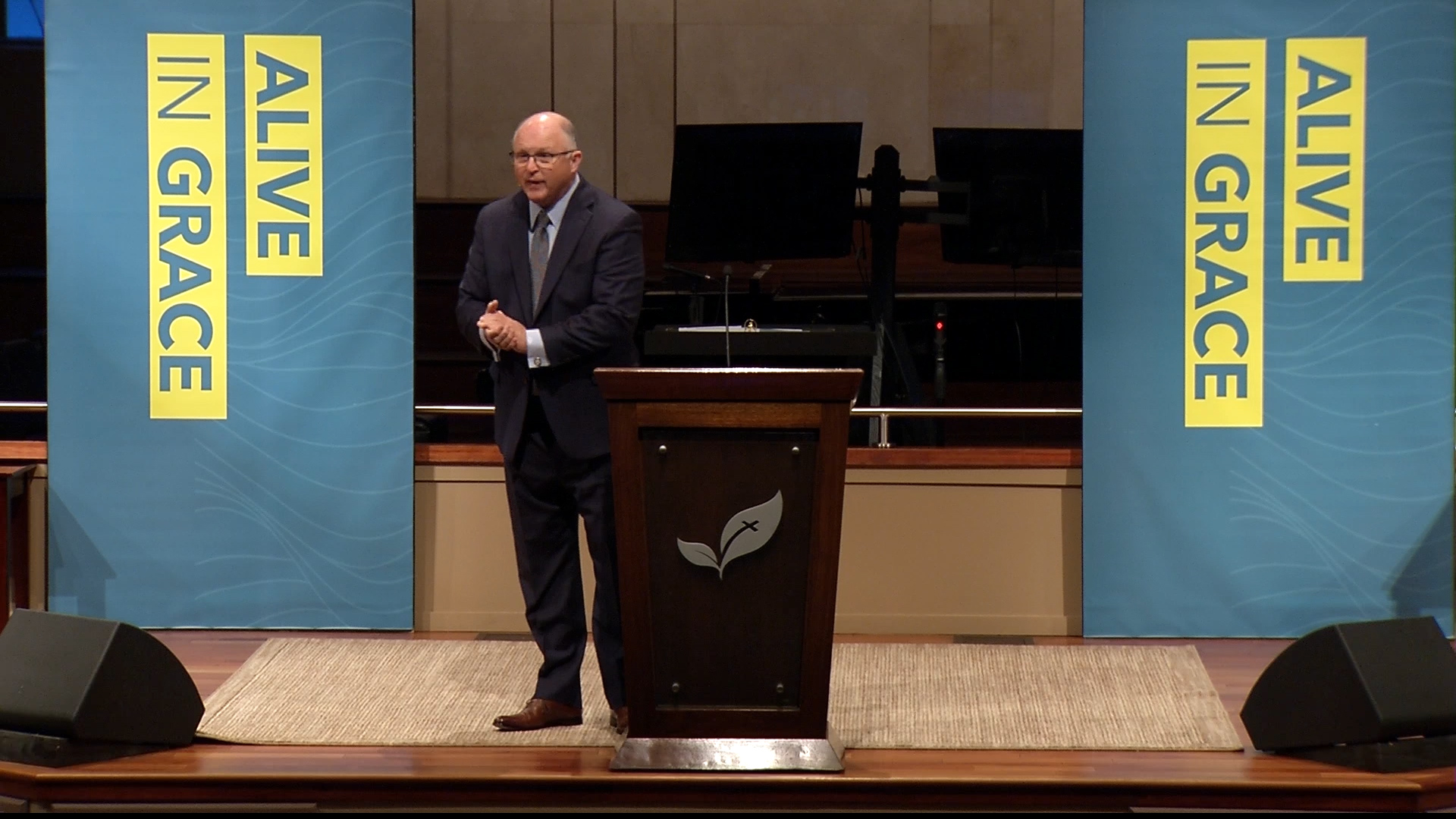Genesis chapter 4 is our beginning point. Let's read verses 1 through 5.
"And Adam knew Eve his wife; and she conceived, and bare Cain, and said, 'I have gotten a man from the Lord. And she again bare his brother Abel. And Abel was a keeper of sheep, but Cain was a tiller of the ground. And in process of time it came to pass, that Cain brought of the fruit of the ground an offering unto the Lord. And Abel, he also brought of the firstlings of his flock and of the fat thereof. And the Lord had respect unto Abel and to his offering: but unto Cain and to his offering he had not respect. And Cain was very wroth, and his countenance fell."
Here we are, the very first family in the Bible. Let's see what we can learn from them today about giving. Let's pray together.
Father, thank you for the truths that we've been learning the last few weeks about how to give. And thank you for the three men that we will study this morning and the lessons we can learn. Help us to grow in grace. And again we pray for the Tanner family this morning. Thank you for their presence with us, for the joy of serving with them through all these years. Give us grace, give them grace, we pray in Jesus' name. Amen. You may be seated.
Well, this morning we take a quick journey of three men in the Bible who gave to God in worship and gave to God for the right reasons; and we're going to learn that wherever the work of God is moving forward, it is preceded by a work of grace in individual hearts. God works in us, then God works through us. Let's say that together: "God works in us, then God works through us." One more time: "God works in us, God works through us."
God will not work through us tonight if he doesn't work in us prior. And the Bible speaks of this in 2 Corinthians 8:7, "As you abound in everything, in utterance, in knowledge in diligence, in love, see that you abound in this grace also." Giving is a grace. It should not be a disgrace, it should be a grace that we're growing in and learning about and enjoying day by day.
Now this morning as we come to Genesis chapter 4 we come to the first family in the Bible and we learn that God brought a man and a woman together. And as basic as that sounds, let me just reiterate: God's plan for marriage is a man and a woman coming together for life; that's God's plan. And then we find that they have two children: Cain and Abel. And I want you to notice this morning in your notes, first of all, that grace gives in worship. People of grace are people that give in their worship to God.
Now here we see that Cain and Abel are going to bring an offering to the Lord, but this was not the first time that an offering was made in the Bible. In fact, the first time that we see a sacrifice in the Bible is found in Genesis chapter 3 and verse 21, and it is there that we see God set a precedent; and this is right after Adam and Eve had sinned. And they covered themselves with fig leaves. But God was not pleased with that; he wanted them to be covered with the coat of a lamb. And so the Bible says in Genesis 3:21, "Unto Adam also and to his wife did the Lord make coats of skins, and clothed them."
And so, we see the first time that there was a sacrifice in the Bible; it was to create a covering for Adam and Eve, and it required the shedding of the blood; and that is significant, as we'll see in just a moment. An innocent animal had to die to cover Adam and Eve's nakedness. God did not accept their coverings, he had a plan that would require the shedding of blood. And this shedding of the blood, which was the first in the Old Testament, became a picture, because throughout the Old Testament there would be the shedding of the blood of innocent lambs for the covering of sin.
And this was always a picture of the Lord Jesus Christ himself; for the Bible tells us that when John the Baptist was preaching one day, in John 1:29, he looked up from the Jordan river and he saw someone walking to him, and that someone was Jesus. And when John saw Jesus, he said, "Behold the Lamb of God, which taketh away the sins of the world." Why would he refer to Jesus as the Lamb of God? Because Jesus was born to shed his blood to be the covering for our sin. And so, from the first offerings in the Bible we see that there was always the sacrifice, and in particular, the sacrifice of the blood of the lamb. This was a way then for men and women to find covering.
Cain and Abel were coming to bring their offering to the Lord, and we see that one man was a shepherd and one man was a farmer. One man who was a farmer decided he would do it his own way; he would give some fruits and some vegetables. God, however, had another way: by way of the blood. And so we see that one man, Cain, was carnal; one man, Abel, was spiritual. One man gave in the flesh, one man gave according to his thoughts; another man gave by grace according to God's thoughts.
And all of us will either give by our own imagination and our own reasoning, or we will give by revelation. You will give by reason or you will give by revelation. Cain gave by reason, what he thought was acceptable; Abel gave by revelation, what he had learned from God. And all of us want to give from a heart of revelation what God has taught us through his word and by his Spirit.
And so, as we come to this I want you to notice, first and foremost as we look here, Cain gave the fruit of the ground, verse 3. The Bible tells us he brought forth the fruit of the ground. And the issue here is not only that he gave fruits and vegetables when God required blood, but also that he gave with a spirit of arrogance.
And there are many like this in churches today. "I know what I can do better than anybody else." "I'm like Frank Sinatra; I'm going to have it all and have it my way." And this was Cain's attitude. "I don't care what's been said before, I'm going to do what I think is best." And it's interesting because when people like this with this self-centered attitude, they tend to go from one mistake, one sin to another sin.
How many of you remember what Cain did after he got so angry? Remember? The first what in the Bible? The first murder in the Bible. And that's how sin is. Sin will always take you farther than you want to go. Sin will always cost you more than you want to pay. And here we see that Cain was following a selfish route.
I read this past week of a lady in Ohio who was shoplifting. She was shoplifting in a Dollar Store. I don't know why that made me chuckle. How many of you know – look, if I'm going to be a shoplifter I might do a little better than the Dollar Store, right? By the way, I'm not going to be a shoplifter, doesn't matter how the offering goes today. Don't worry, Pastor's not going to be a shoplifter, all right.
But she was shoplifting in the Dollar Store, and she was apprehended by the police with her two children, and among the things that she had stolen was a book entitled 101 Ways to be a Great Mom. And that's kind of how it goes with sin, you just cannot ever get it right. That's why some of us for the very first time this morning ought to just say, "Lord, I just want to do it your way," whether it's tithing, whether it's my witness, whether it's being a godly husband or a godly wife or parent, "I just want to do it your way. I'm tired of messing up with sin."
Cain never learned that lesson; Cain just had to do it his way, he gave in the flesh. And notice what the Bible says in verse 5 about God's response. The Bible says, "But unto Cain and to his offering he had no respect." God did not respect or regard his offering because it was not a blood offering. Cain gave of the fruit of the ground, he gave by his reasoning. That's how a lot of Christians give. "Well, I reckon I can do this, and this is what I'm going to do. I don't care what they say, this is the way I see it." And that's what Cain did, the way he saw it.
But notice, secondly, Abel gave a lamb. Abel saw the precedent in chapter 3, he saw the covering that was made in the shedding of the blood, and so he gave by grace. The Bible says in Hebrews 11:4, "By faith Abel offered unto God a more excellent sacrifice than Cain, by which he obtained witness that he was righteous, God testifying of his gifts: and by it he being dead yet speaketh."
Now I want you to get this in your mind today and I want you to think about these words, because Abel did such a good job that it was recorded even in the New Testament, and it's being mentioned today thousands of years later. And when one man obeys God, his children, his grandchildren, generations to come remember.
Sir, what do you want to be remembered for? How do you want to be remembered? And I want you to read this verse with me and I want you to see what it says, Hebrews 11:4. Get your eyes on it with me, because I want to show you a very important principle about giving, Hebrews 11:4. Let's read this together, okay.
Ready, begin: "By faith Abel offered unto God a more excellent sacrifice than Cain, by which he obtained witness that he was righteous, God testifying of his gifts: and by it he being dead yet speaketh." He being dead yet speaketh.
Here was a man who because of his obedience, though, the Bible says, he died at the hands of Cain; yet though he is dead he still speaks out. He still tells us what it is to be faithful, what it is to be generous, what it is to be obedient, what it is to be godly. He being dead yet speaketh.
And I'm thankful today as I think of the testimony of John Tanner, that though he is absent from the body, he is present with the Lord. But his testimony still speaks loud and clear. He lived for the Lord Jesus Christ and his children will know that, and his generations will know that. And I want you to understand that one of the reasons we want to be faithful even in our giving is because it creates a legacy beyond ourselves, beyond this moment. You see, "There is a way which seemeth right unto a man, but the end thereof are the ways of death."
The Bible says you can try it your way, but it's not going to bring God's blessing in your life. Cain did it his way, Abel did it God's way. And look what God says in verse 4 about Abel. It says, "And the Lord had respect unto Abel and his offering." The Lord had respect unto Abel and his offering. God was pleased with what he did.
I hear a lot of young people today saying things like, "Well, I'm in Christ, sanctified; I can do whatever I want to do; it's all good, it's under grace, and so I can live how I want to live because of my position in Christ." Wait a minute, sin still displeases God even after you're saved. And what I want you to understand is that one man's gift displeased God and one man's gift did please God.
And how many of you in your life, your giving, your life of sacrifice to the Lord you wanted to be a life laid down for Jesus that is pleasing to the Lord Jesus? And God said of Abel's sacrifice that he was well-pleased. And so, what is the takeaway from Abel this morning? What can we learn? I believe we can learn this, that we want to give God's way. We don't want to try to give by reason, we want to give by revelation to the Lord. And so, we see a man who gave in worship, and his name was Abel.
Let's look at the second man this morning. If you have your Bible there, turn to Genesis chapter 22, Genesis chapter 22. And this man's name is Abraham; and I want you to see here that grace gives in obedience. I want you to notice this, secondly, grace causes us to give in obedience to the Lord.
Now notice in Genesis 22:1, "And it came to pass after these things, that God did tempt Abraham, and said unto him, 'Abraham.' And he said, 'Behold, here I am.' And he said, 'Take now thy son, thine only son Isaac, whom thou lovest, and get thee into the land of Moriah; and offer him there for a burnt offering upon one of the mountains which I tell thee of.' And Abraham rose up early in the morning, and saddled his ass, and took two of his young men with him, and Isaac his son, and clave the wood for the burnt offering, and rose up, and went unto the place of which God had told him."
Now some of you have been at church for a while and maybe you can read certain words, and it's kind of like other things are on your mind. And some of you are brand new and you read words like this and you're like, "What?" So I want you to see one of the loftiest, one of the greatest stories in all of the Bible this morning, and I want you to let it sink in what God was saying. So look at verse 2 again, and I want you to read it with me. And let's not read like, you know, a dead church with a liberal pastor today; let's read like we believe this Bible's alive today, okay.
So let's read verse 2. All of you get your eyes on it there, Genesis 22:2, and I want you to read it and I want you to think about what God is saying here to Abraham. Ready, begin: "And he said, 'Take now thy son, thine only son Isaac, whom thou lovest, and get thee into the land of Moriah; and offer him there for a burnt offering upon one of the mountains which I will tell thee of.'"
Now I am amazed. We see in verse 1 that God comes, and Abraham immediately is ready to hear God. And we should always be ready to hear God. But I am amazed as I read, first of all, God's request. I want you to notice God's request.
And the Bible says here that he is going to tempt Abraham in verse 1. God does not tempt us to sin, but God tries us, or sometimes he tests us. And we all go through these seasonings that are very difficult; but they're a test, a period of testing from the Lord. And in Hebrews 11:17 the Bible says, "By faith Abraham, when he was tried, offered up Isaac."
In fact, in the New Testament Jesus said, "If any man come to me, and hate not his father, and his mother, and his wife, and children, and brethren, and sisters, yea, and his own life also, he cannot be my disciple." Now God is not commanding us to hate our family, but he is telling us that our love and passion should be so great for him that everything else pales in comparison. And how many of you find that very convicting, and how many of you say, "Wow, I need to love the Lord with a much greater love"?
He says, "That's how much I want you to love me." And he says, "Abraham, you say you love me; but I want to test your love. I want you to take your son Isaac, the promised son, the son that was given in your mother's later years, I want you to take the promise of the seed of Israel up to Moriah, lay him on an altar and sacrifice him for me." This would be the supreme test of the Bible of someone's love for God. It was a sacrifice indeed.
This son of promise was requested now of God. Well notice, secondly, Abraham's response. The Bible says in verse 3, "And Abraham rose up early in the morning." He was immediate in his response. Abraham did not try to negotiate with God, he just immediately – and by the way, folks, when we walk in this room tonight we ought to be coming in immediately as the Lord is leading us in sacrifice to say, "Lord, what wilt thou have me to do?" There's no appearance of delay at all. From Beersheba to Mount Moriah, from his home to Mount Moriah in Jerusalem would have been maybe a three-day journey. And we see that on the map that this was going to require that he hasten up to Mount Moriah.
But Abraham never faltered, he was immediately obedient unto the Lord, verse 5: "And Abraham said unto his young men, 'Abide ye here with the ass; and I and the lad will go up yonder and worship,' notice the faith of Abraham in verse 5, 'and come again to you.'" He expected that God somehow would provide for him in this moment.
Notice his faith also in verse 7, "And Isaac spake unto Abraham his father, and said, 'My father." And he said, 'Here am I, my son.' And he said, 'Behold the fire and the wood. But where is the lamb for a burnt offering?'" Imagine walking with your son and you're going up to the mount, you're having faith in God. Imagine hearing the words we have, "We have fire, we have wood. But, Daddy, where's the offering? Where's the offering, Daddy?" And we see in verse 8, "Abraham said, 'My son, God will provide himself a lamb for a burnt offering.'"
How many of you tonight believe that as you come to give to the Lord that God will provide for you? Do you believe that the Bible says, "Give, and it shall be given"? Do you believe the same God that gave you the job you have now, the home you have now, the family you have now, that he can keep blessing you?
Abraham believed that God could keep blessing. He said, "Isaac, God's going to make a way. I don't know exactly how, but God will make a way." Hebrews 11:17, "By faith Abraham, when he was tried, offered up Isaac: and he that had received the promises offered up his only begotten son."
Our giving then must be faith-filled. It's like one of our missionaries in Africa years ago who had taught the church about giving and tithing, the ten percent on a weekly basis. And on Monday morning there was a knock on his door, and he opened up the door, and there was one of the men of the church. He had a huge fish, and he said, "Pastor, you said we're supposed to give the first part of our increase, we're supposed to give the first one-tenth to the Lord. So here it is; here's my first fish."
And so the pastor took the fish and he said, "Wow," he said, "that's awesome, that's wonderful," and he thanked him. And then the missionary said to him, he said, "If this is your tithe, where are the other nine fish?" and the young man said, "Oh, they're still in the river." That's faith, willing to give the only fish that he had, trusting God to provide the fish that he had not yet caught.
God's request was given, Abraham's response was quick. Notice God's reward. I want you to see this in verse 10, please. It says, "And Abraham stretched forth his hand, and took a knife to slay his son." Uncomprehensible to me.
Imagine the altar that Abraham built on Mount Moriah. Now he lays the wood; now he lays his son. He takes a knife, he stretches out his hand in obedience to God; he is prepared to do whatever God has asked him, believing perhaps that God would even raise him from the dead. And the Bible says in verse 11, "The angel of the Lord called unto him out of heaven, and said, 'Abraham, Abraham.' And he said, 'Here am I.' And he said, 'Lay not thy hand upon thy lad, neither do thou anything unto him: for now I know that thou fearest God, seeing that thou hast not withheld thy son, thine only son from me.'"
And I want you to know that God had provided a lamb in the thicket, and God was able then to allow Abraham to take Isaac off the altar to bring the ram from the thicket and place it on the altar, and to sacrifice it. And I want you to also know that one day because of our sin we deserve death and hell. But Jesus Christ became the Lamb for us. He became the substitute for us. And even as God gave a substitute for Isaac, he has given the substitute for us and his name is Jesus Christ, and he shed on the blood on the cross of Calvary so that we would not pay for our own sin. Jesus paid for our sin and shed his blood on the cross of Calvary for us. God the Father willingly gave his Son Jesus Christ to be the substitute for us, to die in our stead.
Abel, he gave in proper worship by grace. Abraham gave in obedience by the grace of God. Let's look at one more man before we finish, the man David. Turn in your Bible now to 1 Chronicles chapter 21, 1 Chronicles 21, and let's learn here how that God allowed David by grace to give for provision of worship. First Chronicles 21, I want to give you two minutes of background before I give you the lesson. Notice, if you would, in this passage that David commits a great sin. Someone says, "Oh, you mean like with Bathsheba?" No, it's a different sin, but still great in God's eyes.
Notice in verse 1 it says, " And Satan stood up against Israel, and provoked David to number Israel." Verse 5 says, "And Joab gave the sum of the number of the people unto David. And all they of Israel were a thousand thousand and an hundred thousand men that drew sword: and Judah was four hundred threescore and ten thousand men that drew sword." Now David decided that he was going to number Israel. He's going to count his armies, he's going to count his swords, and God said he was displeased with this; it was called the sin of numbering the people.
Now someone might wonder, "Well, what's wrong with numbering? All of us like to number." Sometimes militarily we number our airplanes and we number our troops; and I'm thankful that we have a strong military in the United States of America. But God does not want us to put our trust in the military, he wants our trust to be in him. And the reason this was considered a sin was because David in numbering the people was putting his confidence in his number, putting his confidence in his people, not putting his confidence in the Lord.
And I want to encourage you today, let's not put our confidence in our bank accounts or our investments, let's always keep our confidence in the Lord Jesus Christ himself. Many of us have things that we can look and we can number. In fact, a UCLA study recently found that three out of four middle-class Americans have so much stuff that they cannot put their own car into their garage, they have that much stuff. And I'm simply saying to you this morning that each and every one of us must not put our trust in our numbers, in our possessions, but we must put our trust in God.
And so, God's anger was kindled at David. Notice in verse 7 what the Bible says. It says, "And God was displeased with this thing; therefore he smote Israel." How many of you are getting the idea God did not like this? In fact, the Bible says that he sends a pestilence upon the land.
Notice, if you would, in verse 8, "And David said unto God, 'I have sinned greatly, because I have done this thing: but now, I beseech thee, do away the iniquity of thy servant; for I have done very foolishly.'"
But God brings a famine. Notice in verse 15, "God sent an angel unto Jerusalem to destroy it," called the death angel, "and he was destroying, the Lord beheld, and repented of the evil, and said to the angel that destroyed, 'It is enough, stay now thine hand.' And the angel of the Lord stood by the threshing floor of Ornan the Jebusite."
Now there's a tremendous judgment happening in Jerusalem because of David's sin, and God is bringing judgment; and suddenly the Bible says that this death angel was seen standing in Ornan's threshing floor. Ornan was a Jebusite. The Jebusites were the neighbors of Israel, they were not believers; but it appears that Ornan had put faith in Jehovah God. And so it is that Ornan was standing there and the death angel is standing there, and the Lord Jesus stopped this matter of judgment at that moment. I believe he did this for several reasons; but fundamentally he did it because of the repentance of David.
And I want you to notice the repentance of David here. The Bible tells us that David quickly repented before God, verse 17, "David said unto God, 'Is it not I that commanded the people to be numbered? Even I it is that sinned and have done evil indeed; but as for these sheep, what have they done? Let thin hand, I pray three, O Lord my God, be on me, and on my father's house; but not on thy people, that they should be plagued.'"
Do you see here the repentant heart of God? Notice, if you would, in verse 8 the repentant heart of David rather. Verse 8, "And David said unto God, 'I have sinned greatly, because I have done this thing.'"
Let me just tell you, when you repent to God, don't say, "Well, my wife did this, and my mom did this, and the school did this, and the police did this." When you really repent, you're not going to blame everybody else, you're going to say, "It was me, Lord. I was the one that sinned." And David repented of numbering the people.
But I want you to see the request of David. You see, when you realize that God is going to cover your sin and God is going to withhold judgment, your heart is then to worship God. And I want you to notice what happens in verse 22. The Bible says, "And David said to Ornan, 'Grant me the place of this threshing floor, that I may build an altar therein unto the Lord: that thou shalt grant it me for the full price: that the plague may be stayed from the people.'" Notice the phrase, "full price."
So David wants to now buy the threshing floor. This Ornan's threshing floor was actually the same exact place where Abraham had offered Isaac. It was on a hill in Jerusalem, and David wanted to make another place of sacrifice on this piece of property. And so he requests that he could have the property, and he requests in verse 22 that he could have it for full price.
Now notice in verse 24 what the Bible says. Verse 23 first, "And Ornan said unto David, 'Take it thee, and let my lord the king do that which is good in his eyes: lo, I give thee the oxen also for the burnt offering, and the threshing instruments for wood, and the wheat for the meat offering"; notice this phrase, "I give it all."
So get the picture in your mind. David is coming to Ornan and he's saying, "I want to buy this area because I want to make sacrifice to the Lord." Ornan says to him, "I give it all." He said, "You're the king; I'll give you the property, I'll give you the wood, I'll give you the oxen. David, just take it, you can have it. Go ahead."
And here comes the application, and I want you to see this now that we've developed a little background. Look, if you would, here at David's response to Ornan in verse 24: "And king David said to Ornan, 'Nay; but I will verily buy it for the,' what's the next two words say, 'full price: for I will not take that which is thine for the Lord, nor offer burnt offerings,' what's the next two words say, 'without cost.'"
All right, now let's this get this into our minds. So let's read verse 24. Get your eyes on it. Let's read it together, 1 Chronicles 21:24, ready, begin: "And king David said to Ornan, 'Nay; but I will verily buy it for thee for the full price: for I will not take that which is thine for the Lord, nor offer burnt offerings without cost.'"
David was not going to give an offering that cost him nothing. Ornan said, "Here, just take it, you can have it." David said, "No, this is for the Lord. I'm not going to offer the Lord something that cost me nothing." He said, "I will pay full price because I want to give to the Lord from my heart an offering of sacrifice."
And here we see in the Word of God a tremendous example: a ministry that costs nothing will often accomplish nothing in the Lord's work. And so we must come with a heart that says, "Lord, I want to give you my best, and I will not give you something that costs nothing." I'm not going to come tonight and just say, "Well, I guess I could afford to do this, or I could do this and not even feel it."
David says, "I don't want to do something I don't feel, I want to do something that is of a sacrificial nature for my Lord Jesus Christ." He said, "I'm going to pay full price," and he was going to build this altar right on Mount Moriah, right where Abraham had offered David. Today in Jerusalem that Mount is known by the Dome of the Rock. In the seventh century after the Byzantine period, the Muslim invaders came and built this mosque known as the Dome of the Rock right on Ornan's threshing floor right there at Mount Moriah. That's why there's such dispute between those of Islam and the Jewish people on the Temple Mount we hear about sometimes in the news. But what I want you to realize is that Mount Moriah was the place where David said, "I'm not going to give that of which costs me nothing."
Back in 1886 in Philadelphia there was a little girl that came to Sunday School. She came into the Sunday School, and as she walked into class she was turned away because the class was so crowded. She began to walk down the street, and the pastor of the church saw her, and she was crying; and he helped her get into a class, and she was so thankful for that. Her name was Hattie May. Hattie May was so happy they found a room for her that she went to bed that night thinking, "You know, they need to have a place for more children to hear about Jesus Christ."
About two years later, Hattie May became very ill in the tenement apartment building where she lived; and just days after her illness began she passed away. And her pastor went to the home to visit, Pastor Conwell, and he prayed with her mother; and he was there even during the time of taking her body away. And as her little body was being moved there was a worn and crumpled red purse that was found at the bottom of her bed. Inside the purse they found 57 cents and a note with childish handwriting which said, "This is to help build the little church bigger so that more children can go to Sunday School." For two years she had saved her money, an offering of love for God.
The pastor tearfully read the note and instantly knew what he would do. He carried that note and that cracked little purse right up to the pulpit on Sunday morning. He challenged the deacons to prepare for building. He challenged the people to pray and begin to save. A newspaper heard of the story and wrote the story, and it was read by a wealthy realtor who offered to the church a wonderful piece of property worth thousands of dollars. When the church said that they could not afford it, he said, "Then I'll sell it to you for 57 cents."
Church members began to make larger donations, checks came from far and wide, and within a year of the little girl's passing, over $250,000.00, a huge sum in 1886, had been given for the church. And today if you were to visit in Philadelphia and look up the Temple Baptist Church, you would see the fruit of faith of one little girl who would not give that which cost her nothing, one little girl who worshiped the way that she had learned from the Lord, one little girl who had the spirit of Abraham; and by her faith God did a great work in Philadelphia to raise up a church for his honor and his glory.
Abel gave from a heart of worship to the Lord. Abraham gave from a heart of obedience to the Lord. David gave for the provision of a place to worship and to repent before his God; and he would not give that which cost him nothing. This morning as we sit in this auditorium, we're mindful of so many years, men like brother Bill Weible, who've given for so many years. For 33 years he's reached back and reached in, and sold this, and worked that and made a way to continue to give to provide; and now the need for the children's space.
And when I think of that and when I think of the intersection of this weekend, I can't help but think of John Tanner and his family this morning, can't help but think of thinking of when I sat in the Tanner's home years ago and they joined the church. John began to grow here as a little boy in Sunday School; and when he was saved and baptized, and as a teenager in the Youth Department growing and learning of the Lord, and working in Kid City, and working in the Bus Ministry; lately, working in the Teen Ministry; and then meeting his wonderful wife here at West Coast Baptist College and their two children, and just all of the blessings. But you see, it was a church family like this that gave so that young people like this could grow up. And now their children will grow in a place of love and provision.
May we not miss this fact. Buildings do not change lives, but what happens in them changes lives. People's lives are touched for the glory of God. Cain and Abel – two different men, two different ways. We see one man giving by his reasoning, one man giving by his revelation. You see, God has always required a blood sacrifice.
There might be someone here this morning and you do not know that your sins are forgiven. You do not know what it means to have a home in heaven or a Christian family. Well, please understand this: the Bible says that our redemption is made possible by the shedding of the blood of Jesus Christ. Ephesians 1:7, it is by that shedding of the blood that we can have a covering just like Adam and Eve, just like Abel, just like those throughout the Old and now the New Testament. The Old and the New Testament covenants are sealed with blood.
And today we speak of the blood of Jesus Christ, the Lamb of God. And if you've never accepted Christ as your Savior you could do that today, and your sins could be washed away, and you could begin to live a life and make a legacy not based on the numbering of who you are what you have, but a legacy based upon how great Jesus Christ is. I want to challenge you today; if you've never accepted Christ, to receive him. And if you have accepted Christ as your Savior, I want to challenge you to live with the grace of Abel, the faith of Abraham, and the heart of repentance of David, and to express that in our giving tonight.
[End of Audio]

